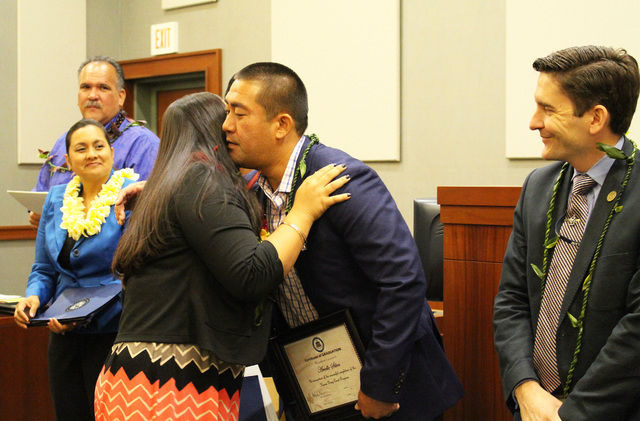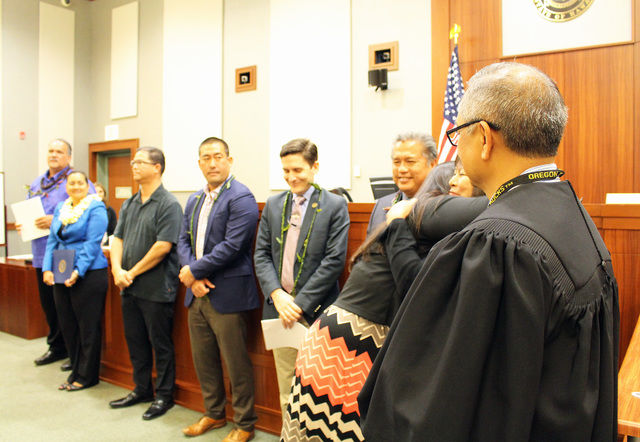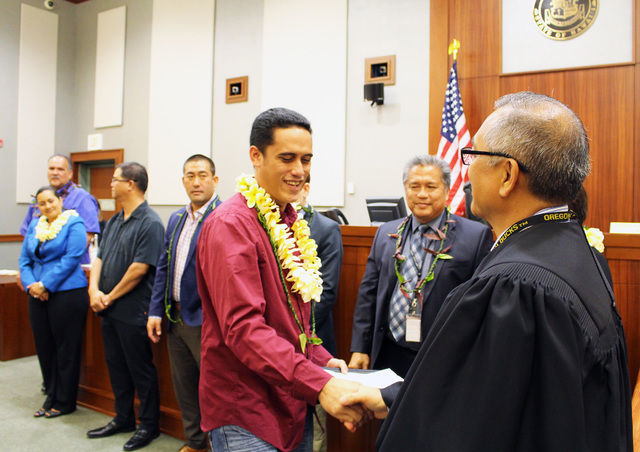LIHUE — Today is only the beginning. That was the message participants took from Friday’s 27th Kauai Drug Court graduation ceremony. Eight graduates took to the podium to talk about the lowest point of their lives and how the program
LIHUE — Today is only the beginning.
That was the message participants took from Friday’s 27th Kauai Drug Court graduation ceremony. Eight graduates took to the podium to talk about the lowest point of their lives and how the program they had just completed helped save them.
“If it wasn’t for this program, I would probably be in jail or on the streets or maybe even dead. The struggle is real,” said Kawai Manini-Matsusaka. “This program has helped me to be responsible and honest and has reminded me to never give up on my goals. I’m also thankful for all the hardships I have to go through because they made me a stronger and better person today. I’m looking forward to the future and living my life to the fullest. I’m super stoked for being a dad.”
Drug Court Director Martin Steinhaus described Manini-Matsusaka an individual who started as someone with his own agenda and who tried to get away with deception, but then turned his life around through the program.
Manini-Matsusaka had five felony charges against him before joining two years ago.
“The Kauai Drug Court is an excellent example of a program that provides alternatives to incarceration,” said Fifth Circuit Chief Court Administrator David Lam. “Through this intensive 18-month minimum program, we are able to rehabilitate individuals as well as restore and reunite families.”
The courtroom Friday was filled with family, friends, elected leaders and members of the community who came to cheer on their extended ohana.
Many wiped away tears as graduates told a history of a drug-filled past and broken family relationships that took years to repair. Others thanked their families for supporting them, despite their addiction.
Arielle Silva, who was inducted into the program on Aug. 25, 2014, called the experience a “long journey” and only the beginning for her.
Since she took steps to seek counseling through the drug program, she has been able to go to school and get her degree and wants to pay it forward by being a drug counselor, she said.
“I am finally able to live a happy and healthy life,” she said. “I thank God every day for giving me this life. This is only the beginning.”
Rep. Derek Kawakami said Friday’s graduation was a “rebirth.”
“A brand-new experience. It’s like wiping the slate clean for them,” he said.
Drug court began in 2004 as a way to give participants access to a court-based intensive outpatient substance abuse treatment program, which also provides intensive case management and probation supervision, Lam said.
The participants go through rigorous testing including frequent and random drug and alcohol testing, mental health evaluation and treatment, assistance with obtaining employment and housing, random home visits, strict curfew monitoring, and frequent review hearings before the drug court judge, Lam said.
The program offers incentives and rewards to clients who maintain sobriety and are either attending school or training, or are gainfully employed, he said.
Drug Court clients also perform community service projects throughout the year, he said.
The recidivism rate from November 2004 to November 2015 was 28 percent, according to statistics from the Hawaii State Judiciary.
Fifth Circuit Court Chief Judge Randal Valenciano said the drug program is important because it’s for the community.
“If we can change their outlook and get them away from drugs, then they can transform from being a negative influence into a positive influence and they touch other people, so we’re hoping that the benefit is widespread,” Valenciano said. “An exponential benefit.”




